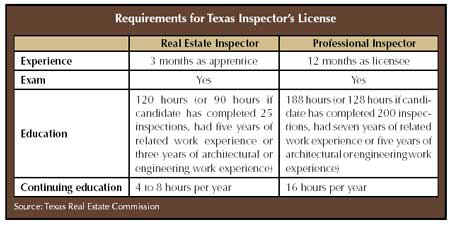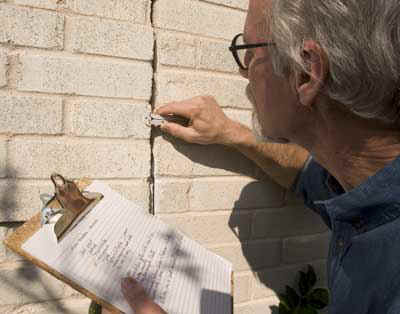|
|
|
Although inspectors are trained and experienced, they cannot find everything that is wrong with a home. |
Houses are complex. Many things can go wrong - some minor and others hugely expensive.
A survey by the National Association of Realtors® (NAR) and the American Society of Home Inspectors reveals that 77 percent of homebuyers obtain a professional inspection prior to closing, and 81 percent include an inspection contingency in the sales contract. These findings suggest that homebuyers understand a good inspector has the knowledge and experience needed to detect most flaws and deficiencies.
Barry Stone, a columnist for HouseDetective.com, says professional affiliation is one of the most important characteristics to look for when choosing a home inspector. Most professional organizations require a specific level of training and experience before conferring a designation or membership on an inspector. For consumers faced with choosing from many inspectors, professional designations may serve as the equivalent of brand names.
Often homebuyers rely on the real estate agent to find an inspector. The NAR survey found 69 percent of buyers used an inspector referred by the sales agent. That puts pressure on the agent because an inept inspector may ruin a transaction or taint the recommending licensee's reputation.
Anyone offering services as a Texas home inspector must be licensed by the Texas Real Estate Commission (TREC). The state's method for licensing inspectors is similar to that for real estate agents. There are two levels: residential inspector and professional inspector. The first level is for those entering the business. A professional inspector license requires 12 months experience as a licensed inspector. Both licenses require education in core real estate courses, as well as continuing education after the license has been granted. Candidates must pass competency exams before either license is granted (see table).
|
|
|
Although inspectors are trained and experienced, they cannot find everything that is wrong with a home. |
Many inspectors belong to professional associations. These organizations usually require allegiance to a code of ethics and may require members to follow standardized procedures for inspections.
Six such organizations have Texas members.
Texas Association of Real Estate Inspectors (www.tarei.com). By far, TAREI has the largest membership (630 members) in Texas, mainly because it operates exclusively within the state. Established in 1977, it is the oldest inspector association in the state. Local chapters are in San Antonio and North Texas.
The framework for TAREI's standards of practice and code of ethics was modified by TREC and adopted as the current standard for all state inspectors. The organization provides continuing education to help members fulfill the state requirements. Membership categories are:
· Certified Professional Inspector. Requires five years experience, 1,500 inspections and 320 hours of continuing education. Must pass TAREI exam.
· Advanced Inspector. Requires 750 inspections and 144 hours of continuing education.
· Inspector. Requires 300 inspections and 64 hours of continuing education.
· Associate. Requires 50 inspections and six months experience.
American Society of Home Inspectors (www.ashi.com). This is the largest national organization of home inspectors. Twenty-three Texas members are listed as is one local chapter, Lone Star ASHI (www.ashitexas.org). Members must pass the national home inspector exam and subscribe to ASHI standards and ethics.
Prospective members must submit a demonstration inspection report that conforms to the society's standards. To take the exam, candidates must have completed 250 inspections. No additional experience or education is required. The organization offers training through its home training system.
Housing Inspection Foundation (www.iami.org). This organization has 13 Texas members but no local chapters. To become a registered home inspector, a candidate must have a college degree in a field related to inspection, professional training in inspection or related fields or two years experience as an inspector. Members subscribe to a code of ethics.
National Association of Home Inspectors (www.nahi.org). This is another large national organization with a few Texas members. Members have completed 250 inspections, passed a special exam and are designated certified real estate inspectors. Members must complete 16 hours of continuing education each year and must adhere to a code of ethics.

American Inspectors Society (www.homeinspectortraining.com). Members must complete the society's three-day training program during which they complete three demonstration inspections according to society guidelines and specifications.
American Association of Home Inspectors, Inc. (www.aahi.com). Attaining the association's certified home inspector designation requires extraordinary effort. Candidates must have either three years experience or 90 hours of classroom training from an approved source.
One sample inspection report from the candidate's files must be submitted for review for each year the candidate has been in business. Candidates must present reference letters from clients and agents. Finally, candidates must pass the association's exam.
· Professional Engineer. Common among engineers who do consulting work, this designation goes well beyond the requirements for home inspectors. Professional engineers are useful if a serious structural problem is suspected in a home.
· A professional engineer must have an engineering degree from a four-year institution of higher learning and must be licensed by the state. Candidates begin the licensing process by passing an engineering fundamentals exam. After earning at least four years of engineering experience, candidates must pass an engineering principles and practices exam to receive their licenses.
· Certified One- and Two-Family Dwelling Inspector. This designation is given to those who pass a course in building code enforcement offered by the International Code Council. These inspectors are certified in the use and interpretation of the building code as it relates to residential construction.
· Certified Mechanical Inspector. Those who pass a specialized exam administered by the American Society for Quality receive this designation. These inspectors are qualified to inspect mechanical components of a structure.
· Certified Environmental Inspector. This credential is awarded by the Environmental Assessment Association to those who meet requirements for conducting inspections of environmental conditions. An appropriate college degree is required as well as continuing education in environmental assessment or two years experience in the business. An inspector with this designation may be needed when environmental contamination is suspected.
Thorough inspectors may abort sales by uncovering serious problems, making them unpopular with real estate professionals in some cases. However, it may be better to lose a sale than to end up with an unhappy buyer and a potential lawsuit. When helping a buyer find an inspector, it is best to offer recommendations, give reasons for the choice and let the buyer make the decision.

Buyers also should be told the following about inspectors.
Although inspectors are trained and experienced, they cannot find everything that is wrong with a home. Some things may work correctly on the day of the inspection and fail only under certain conditions. An inspection is only a visual examination. Some defects will not be discovered without partial destruction or dismantling of the structure. Inspectors' responsibilities do not include such intensive investigation.
An inspection does not protect a seller from the repercussions of undisclosed defects that the seller knows about or should know about. The buyer retains access to legal remedies whether or not an inspection is conducted.
An inspector should not shy away from recommending a specialist when a problem is suspected and the inspector lacks the expertise to do an in-depth evaluation.
The inspector should do a walk-through with the buyer to point out and explain items that need attention. The buyer must receive a written report on the inspector's findings, according to TREC rules.
Some buyers try to use an inspection checklist to pressure the seller into paying for a host of repairs, including replacing components that are worn but serviceable. To prevent this, the inspection report should clearly indicate the seriousness of problems discovered. Purely cosmetic repairs that are not structural, mechanical or related to water penetration should be differentiated from problems with safety implications.
An experienced, reputable inspector should be willing to provide homebuyers a sample inspection report that has been modified to omit the address of the home and the identity of the client. This would give potential clients an idea of what the inspection will cover and how findings are documented.
Be wary of an inspector who is ready to inspect a home on a moment's notice. Professional inspectors are consultants. The better ones work a regular schedule and may be booked weeks in advance during peak buying seasons.
The basics of a good inspection are included in the training and guidelines promoted by professional home inspection organizations. While inspector credentials are not a guarantee of good service, they should improve the odds of getting a comprehensive, accurate assessment of a home's condition.
Dr. Harris (jharris@cgsb.tamu.edu) is a research economist with the Real Estate Center at Texas A&M University.